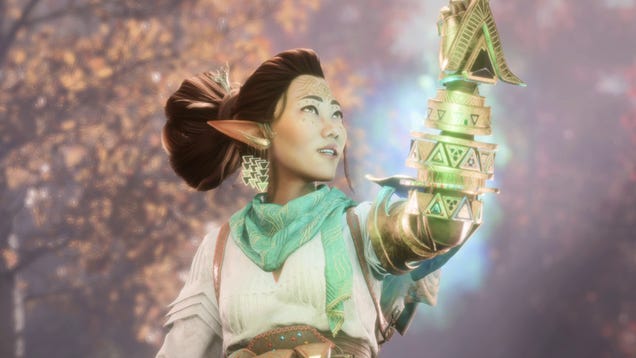
BioWare’s upcoming RPG Dragon Age: The Veilguard seems heavily influenced by 2011’s Dragon Age II. It’s evocative of the second game’s action-driven combat, goes back to its three-path tone-driven dialogue, and its letting you romance any character you want. However, it does seem BioWare learned some lessons in the 13 years since Dragon Age 2, as it will be circumventing one of the criticisms of the second game’s approach to romance and identity.
In 2011, Dragon Age 2 was an early example of what would colloquially go on to be called “playersexual” romance. This refers to when players can romance any paramour regardless of their character’s gender. Games like this are often criticized for making characters feel like they are molded by the player’s presence, rather than people with their own individual identities. Dragon Age 2’s four main romanceable characters are all bisexual, but the game has a storyline involving party member Anders, whose past relationship with a man is only brought up if protagonist Hawke is a man. DA2 writer David Gaider told Kotaku in February this was meant to distinguish Anders’ relationship with male or female versions of Hawke, but recognizes this comes off like the mage’s identity was a switch to be flipped in hindsight.
Advertisement
“Unfortunately, we just didn’t have enough time to get enough feedback and iterate on those situations,” he said. “We would hit a particular interaction, we would make a judgment call either as a group or the writer on their own, and that was it. There was no time for anything more than one gut-check, which is probably not the way to go.”
The Veilguard, meanwhile, seems to be going out of its way to make it clear each of its party members are pansexual, regardless of who Rook is or if they’re initiating a relationship with them. In an interview with IGN, Veilguard director Corinne Busche said the team was cognizant of how these player-facing relationships can be “off-putting,” and wants to make it clear that each of these characters’ identities are independent of the player. This can be through their other previous romantic histories, or future love stories that have yet to unfold.
Advertisement
“Their past experiences or partners, they’ll reference them and indeed who they’ll become romantic with,” Busche tells IGN. “For instance, we saw Harding. I might be playing a straight male character flirting with her, but I choose not to pursue a romance. She might get together with Taash. So my perception, my identity has no bearing on their identities and that comes through really strongly.”
That The Veilguard’s companions can end up in relationships with each other if you pursue them is exciting, and something Dragon Age has done in previous games. If you’re going to have a cast of pansexual misfits, some of them might as well start smooching. It’s also one of the surefire ways to demonstrate a character’s identity without it having anything to do with the player. Anders’ story may have run into this clarity issue in Dragon Age II, but party members Fenris and Isabela enter a relationship with each other if the player doesn’t pursue either. This helped alleviate the feeling that their identities were tied to Hawke, so at the very least, it seems BioWare is aware of criticisms that follow the free-for-all romance approach and is trying to circumvent them.
Advertisement
Dragon Age: The Veilguard is coming to PC, PlayStation 5, and Xbox Series X/S this fall.
.

